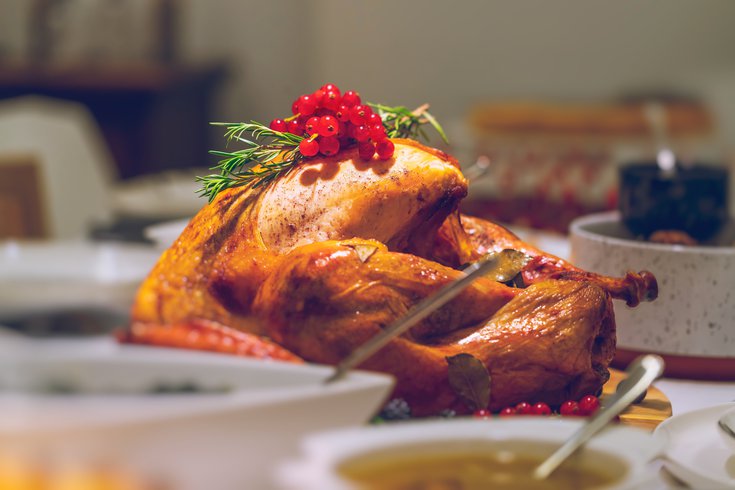
November 17, 2021
 Source/Image licensed from Ingram Image
Source/Image licensed from Ingram Image
With an arsenal of vaccines and treatments now available, Thanksgiving celebrations are back on, but it is important to remember that the coronavirus is still a potential threat for the unvaccinated and other vulnerable people.
Thanksgiving is shaping up to be much different than last year, when public health experts warned people to stay home and avoid in-person gatherings with extended family and friends.
With an arsenal of vaccines and treatments now available, holiday celebrations are back on, but it is important to remember that the coronavirus is still a potential threat, especially for the unvaccinated and other vulnerable people. Cases are again rising across the country, including in the Philadelphia region, as the winter months approach.
As people prepare for their Thanksgiving celebrations next week, health experts advise them to be mindful of the tools they have to keep COVID-19 out of holiday gatherings.
"We have a lot more tools to keep safe this year," said Dr. Richard Wender, chair of Family Medicine and Community Health at Penn Medicine. "And it is important to connect with people. I think everyone is ready to be with loved ones this Thanksgiving."
No prevention strategy is 100% foolproof, said Dr. Efrat Kean, an emergency medicine physician at Jefferson Health. But when they are layered on top of one another, they improve protection. She used a block of Swiss cheese as a metaphor. A single slice has a lot of holes in it, but when layered together, there is a solid block of cheese.
"It comes down to a calculated risk," Kean explained. "At this stage of the pandemic, when there is so much variability in everyone's vaccination status, there is no easy answer of whether it is safe to gather together this year."
Kean advised people to answer three questions to help them determine whether they feel comfortable attending a holiday gathering:
1. What is my personal risk of severe illness and hospitalization if I get infected?
2. What is the level of risk for others at the gathering? Are there going to be any guests who are considered high-risk?
3. What are the strategies everyone can follow to reduce the risk?
If people are not comfortable with the risk of exposure, or the extent of precautionary measures being taken, they can politely decline an invitation or decide not to host.
For people ready to attend Thanksgiving gatherings, Wender and Kean offered tips on how to do so as safely as possible.
Vaccination is the most important tool, Wender said. Clinical evidence shows that unvaccinated people are more than 12 times more likely to get COVID-19 and more than 20 times more likely to die from it.
Everyone age 5 and over can now be vaccinated – and they should be to protect themselves and their family and friends, Wender said. Children ages 5-11 only will have enough time to get their first doses, but at least they will offer some level of protection.
Booster shots also are strongly advised for people who are eligible.
COVID-19 testing, whether it is via a PCR – polymerase chain reaction – or a rapid test, is especially important for gatherings where some guests will not be fully vaccinated, Wender said.
PCR tests must be prescribed by a doctor and sent to a lab for processing. They offer the most accurate results, but it takes more time than rapid tests, which can be purchased over the counter. Tests should be taken within three days of the gathering, Wender said.
Even for gatherings where everyone is vaccinated, testing is a good idea. When Kean hosts a gathering of family or friends, she asks everyone to take a rapid test at the door.
Wender acknowledged that there is a health equity issue when it comes to access to COVID-19 testing.
"I am personally frustrated about the limited access and cost of rapid testing," he said.
Everyone attending Thanksgiving gatherings should be conservative in their behaviors in the weeks leading up to the holiday, the experts emphasized.
That means wearing masks indoors when not at home and avoiding crowded situations that potentially could result in COVID-19 exposures right before Thanksgiving.
Kean advised people to discuss this expectation with all guests as early as possible, so everyone is on the same page.
People who are traveling for the holiday need to be vigilant about their safety and the safety of the loved ones they are visiting, Wender said.
There is still a lot of COVID-19 in the country, he said. More 80,000 people are diagnosed every day and airports and rest stops are going to be packed. Travelers are advised to be safe in these settings by wearing a mask and socially distancing as much as possible.
Should mask-wearing be a part of your holiday celebrations? It's not practical to ask that of all guests, Wenders said. But it adds a layer of protection if people do.
In the Northeast, it's also not practical to hold an outdoor gathering as temperatures continue to drop. That makes good indoor ventilation critical.
Keep windows open during gatherings, if possible, Kean suggested. Some air purifiers also can filter out virus particles. She uses them when she has gatherings at her home.